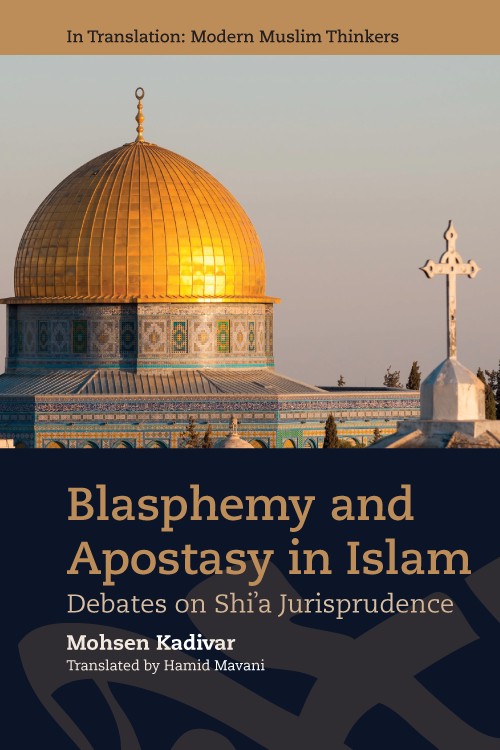Blasphemy and Apostasy in Islam:
Debates on Shi’a Jurisprudence
Mohsen Kadivar
Translated by Hamid Mavani
Preface by Gianluca Parolin
In Translation: Modern Muslim Thinkers, Series Editor: Abdou Filali-Ansary
Edinburgh: Edinburgh University Press, April 2021 (in association with Aga Khan University Institute for the Study of Muslim Civilizations, London, United Kingdom)
411+xviii pages
- ISBN: 9781474457576

‘Professor Mohsen Kadivar brilliantly demonstrates theoretically and historically that charges of blasphemy and apostasy should no longer be prosecuted but instead viewed through the Islamic tradition of toleration and co-existence.’ (Roy Parviz Mottahedeh, Harvard University)
Take a front-row seat to the debate on blasphemy and apostasy in Islam
Is it lawful to shed the blood of a man or a woman who insults the Prophet Muhammad? Does the Qur’an stipulate a worldly punishment for apostates? Beginning with a genealogy of religious freedom in contemporary Islam, this book tells the gripping story of Rāfiq Taqī, an Azerbaijani journalist and writer, who was condemned to death by an Iranian cleric for a blasphemous news article in 2006.
Delving into the most sacred sources for all Muslims – the Qur’an and Hadith – Mohsen Kadivar explores the subject of blasphemy and apostasy from the perspective of Shi’a jurisprudence to articulate a polarisation between secularism and extremist religious orthodoxy. In a series of online exchanges, he debates the case with Muhammad Jawad Fazel, the son of Grand Ayatollah Fazel Lankarānī who issued the fatwa pronouncing death penalty on Taqī. While disapproving of the journalist’s writings, Kadivar takes a defensive stance against vigilante murders and asks whether death for apostasy reflects the true spirit of Islam.
Key Features
- Presents a back-and-forth debate between modern two Shi’a jurists (one conservative, one reformist) that locates the exact points of controversy surrounding apostasy and blasphemy
- Engages with the broader subjects of religious freedom and human rights, addressing both secular and religious interests
- An extensive new introduction and annotations throughout the text from Mohsen Kadivar bring the work up-to-date and place it in its academic and public contexts
- A preface by Professor Gianluca Parolin explains the importance of the translation and the value of its contribution to current scholarly debate
Contents:
Introduction
- Literature Review of Religious Freedom and Apostasy in Contemporary Sunni Islam
- Literature Review of Religious Freedom and Apostasy in Contemporary Shi’i Islam
- The Genealogy of the Book’s Ideas and Its Merits
Part I: Apostasy and Blasphemy
The Background of the Treatise
- Legal Ruling on Assassination by Lankarānī Sr. and Statement of Delight by Lankarānī Jr. at its Implementation
- Objections to the Fatwa of Assassination – by Kadivar
- Response to Doubts Surrounding Apostasy – by Lankarānī Jr.
Treatise on Refuting the Punishment for Apostasy and Blasphemy – by Kadivar
- Issuing a ruling on the death penalty by a process that falls outside the sphere of a competent court will engender lawlessness and anarchy
- Claiming the validity of the death penalty for apostasy and blasphemy is based on one deficient ‘isolated report’ (khabar al-wāḥid).
- Refuting the claim that most of the hadiths on apostasy are ‘mutawātir’
- Refuting the claim of consensus (ijmā‘) and the necessity to implement the death penalty for apostasy and blasphemy
- No one, during the time of the Prophet, Imam Ali, and the other Imams, was sentenced to death solely for apostasy
- The Absolute Cessation of the Ḥudūd Punishments or those that Necessitate Death Penalty and Injury, and Suspension During the Time of the Imam’s Occultation
- ‘Isolated reports’ (khabar al-wāḥid) are non-probative in matters of critical importance
- Issuing fatwas on killing an apostate or a blasphemer weakens and tarnishes Islam
- Alteration of the subject of apostasy and objecting to the perpetual applicability of the death penalty for apostasy and blasphemy
- The incompatibility of executing an apostate or a blasphemer with explicit Qur’anic verses
Appendix 1. A Further Clarification to Lankarānī Jr.’s Position
Appendix 2. Rāfiq Taqī in His Own Words and in the Words of His Defenders
Part II: Freedom of Expression and Hate Speech – by Kadivar
- Islam: Between Freedom of Expression and Hate Speech
- Letter of Censure to the Jurists Who Issued the Latest Judgement on Apostasy
- Insulting the Prophet is a Form of Hate Speech
- Request for Clarification from the Jurists Who Defend ‘Suffocating the Religionists’
Appendix 3: Imam [Ali]: Political Leader or Exemplary Role Model – by A. Gharavī
Glossary; Bibliography; Index
About the Contributors
Keywords:
Iran, Jurisprudence, Islam, Religious Freedom, Islamic Law, Sharia

